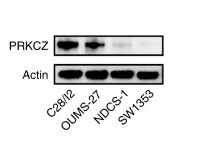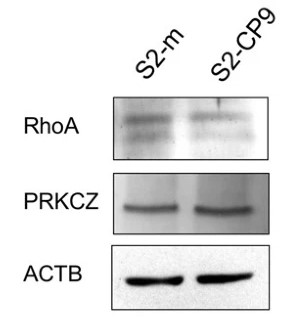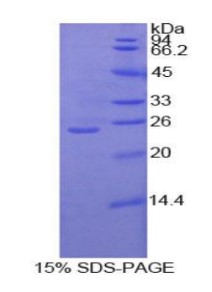PRKCZ
-
Official Full Name
PRKCZ protein kinase C, zeta -
Synonyms
PRKCZ;protein kinase C, zeta;protein kinase C zeta type;PKC2;nPKC-zeta;PKC-ZETA
Recombinant Proteins
- Human
- Zebrafish
- Rat
- Mouse
- E.coli
- Mammalian Cells
- Sf9 Cells
- HEK293
- Insect Cells
- Sf21 Cells
- GST
- His
- Non
- T7
- Avi
- Fc
- DDK
- Myc
- Flag
Background
What is PRKCZ protein?
The PRKCZ Protein, known as Protein Kinase C Zeta Type (PRKCZ), has generated considerable attention for its role in a range of physiological processes. Fiorenza and Mochly-Rosen initially discovered the PRKCZ gene in 1987, establishing its link to essential physiological processes. It is an important member of the protein kinase family. These are enzymes that act as regulators of cell activity by transferring phosphate groups from adenosine triphosphate (ATP) to specific other proteins.
The PRKCZ gene is found in humans on chromosome 3, specifically at the location 3p21. PRKCZ is a member of the protein kinase C (PKC) family of serine-threonine kinases. It encodes a protein of approximately 68 kDa size, which undergoes a variety of post-translational modifications that affect its cellular localization, protein-protein interactions, and enzymatic activity.
The PRKCZ protein structure includes an N-terminal regulatory domain and a C-terminal kinase domain. Even though most PKC isoforms possess a diacylglycerol (DAG)/phorbol ester-binding domain and a phospholipid-sensitive calcium-binding domain, PRKCZ lacks them. Instead, it contains a domain, PB1, that mediates protein-protein interactions at its N-terminal.
What are the functions of PRKCZ protein?
The PRKCZ protein plays a significant role in several cellular processes. It is necessary for the regulation of cell survival and proliferation, protein translation, autophagy, and immune response. The PRKCZ protein is also involved in various intracellular signaling cascades, such as the insulin signaling pathway and the NF-κB signaling pathway, which play crucial roles in cell metamorphosis and response to stress signals.
PRKCZ protein related signal pathway
PRKCZ is also involved in the regulation of the mTORC1 and mTORC2 complexes, essential components of the mTOR signaling pathway that regulates cell growth and survival. Furthermore, PRKCZ plays a critical role in reinforcing and prolonging signal transduction in the T cell receptor (TCR) and B cell receptor (BCR) signaling pathways for effective adaptive immune responses.
Wnt/β-catenin pathway: PRKCZ phosphorylates β-catenin and regulates its transcription co-activator function.
NF-κB pathway: PRKCZ activates NF-κB signaling by phosphorylating IκBs, releasing NF-κB for nuclear translocation and gene transcription.
Ca2+ signaling pathway: PRKCZ regulates IP3 and ryanodine receptors involved in maintaining intracellular Ca2+ homeostasis.
JNK/p38 MAPK pathway: PRKCZ phosphorylates and activates upstream kinases like MAP3Ks, initiating JNK/p38 MAPK cascades.
TGF-β signaling: PRKCZ regulates Smad proteins and modulates TGF-β induced epithelial-mesenchymal transition.
PI3K/Akt pathway: PRKCZ interacts with and phosphorylates Akt, regulating its multiple downstream effects.
PRKCZ Related Diseases
Dysregulation of the PRKCZ protein has been linked to numerous diseases. High levels of PRKCZ expression have been associated with tumorigenesis and cancer progression in multiple cancer types, such as breast cancer, pancreatic cancer, and clear cell renal cell carcinoma (ccRCC). Other diseases linked to PRKCZ dysregulation include Type 2 diabetes, due to the protein's role in insulin signaling pathways, and neurodegenerative disorders like Alzheimer's disease, where an elevated level of kinase activity of the PRKCZ gene has been witnessed.
Cancer: Aberrant PRKCZ activity linked to several cancers like breast, prostate, colon via altered proliferation, survival pathways.
Neurodevelopmental disorders: Mutations affecting PRKCZ function implicated in cognitive deficits and autism.
Cardiovascular diseases: PRKCZ overactivation involved in cardiac hypertrophy, heart failure pathogenesis.
Schizophrenia: Genome-wide studies have linked variants near PRKCZ gene locus to increased schizophrenia risk.
Immune disorders: Changes in PRKCZ activity associated with autoimmune conditions like rheumatoid arthritis.
PRKCZ protein's applications
Subsequently, the PRKCZ protein has numerous applications in therapeutic interventions. In cancer treatment, PRKCZ inhibitors are currently under exploration to possibly limit the aggressive characteristics of particular types of tumors attributing to this protein. Furthermore, developing therapeutic strategies that modulate the PRKCZ function could also play a significant role in treating metabolic conditions, such as insulin resistance and obesity. In neuroscience, PRKCZ's ability to influence synaptic functionality proposes a potential treatment strategy for cognitive deficits in neurodegenerative diseases.
- Cancer therapy: Targeting overactivated PRKCZ may help treat cancers driven by excessive proliferation.
- Neuroprotection: Modulating PRKCZ activity may aid conditions like autism and ischemia via cell survival/plasticity effects.
- Immunomodulation: Precise targeting of PRKCZ signaling helps modulate immune responses in autoimmune diseases.
Case Study

(Eijiro Shimada, 2022)
Fig2.PRKCZ expression in each cell line determined by western blotting. C28/I2, human chondrocyte cell line for comparison. In c–h PRKCZ-overexpressing NDCS-1 vs. mock-transfected NDCS-1.

(Carlo Laudanna, 2010)
Fig3. The level of expression of RHOA and PRKCZ in S2-m and S2-CP9 subclones of the SUIT-2 pancreas cancer cell line is overlapping. Actin (ACTB) served for normalization. Panel
Quality Guarantee
High Purity

Fig1. SDS-PAGE (Cat. No.: PRKCZ-6885H)
Involved Pathway
PRKCZ involved in several pathways and played different roles in them. We selected most pathways PRKCZ participated on our site, such as Rap signaling pathway,Chemokine signaling pathway,Sphingolipid signaling pathway, which may be useful for your reference. Also, other proteins which involved in the same pathway with PRKCZ were listed below. Creative BioMart supplied nearly all the proteins listed, you can search them on our site.
| Pathway Name | Pathway Related Protein |
|---|---|
| Chemokine signaling pathway | GRK1,GNG12,PLCB3,CCL18,CXCL12,CRK,GRK4,PIK3R2,Adcy4,NFKBIA |
| Tight junction | MPP5A,CASKB,LLGL2,F11R,CLDN5,CASKA,MYL12.1,MYL2,CLDNJ,CLDN19 |
| Type II diabetes mellitus | MTOR,HKDC1,PIK3CG,IKBKB,CACNA1G,INS-IGF2,ADIPOQ,INSR,INS2,TNF |
| Insulin resistance | PPP1R3B,PIK3R2,INSB,CRTC2,PPP1R3DA,OGT,TBC1D4,NR1H2,PRKAB1,MAPK8A |
| Sphingolipid signaling pathway | PPP2R1A,PPP2R3C,MAP3K5,NFKB1,PPP2R2A,PLCB4,GNAI1,PPP2R3A,SGPL1,HRAS |
| Insulin signaling pathway | PDE3B,CALML3,INPPL1,PRKAB2,KRAS,SOCS3B,CBL,PPP1CB,PHKG1B,CALM2A |
| Hippo signaling pathway | INADL,TGFBR2,CRB1,ACTG1,TEAD4,BTRC,WNT7B,TP73,TEAD1,WNT10B |
| Rap signaling pathway | KRAS,RASGRP3,PLCB3,FARP2,PRKD1,PLCB4,Adcy4,PLCB1,BRAF,FGF16 |
| Endocytosis | CCDC53,CXCR4B,ARAP2,ARF6A,ARAP3,SMURF2,SMAP1,SNX3,TGFB3,HLA-B |
Protein Function
PRKCZ has several biochemical functions, for example, 14-3-3 protein binding,ATP binding,insulin receptor substrate binding. Some of the functions are cooperated with other proteins, some of the functions could acted by PRKCZ itself. We selected most functions PRKCZ had, and list some proteins which have the same functions with PRKCZ. You can find most of the proteins on our site.
| Function | Related Protein |
|---|---|
| protein kinase activity | PDK1,EEF2K,PIK3R4,STK24,ARAF,CAMK1GB,TSSK5,PAK1,TGFBR1,RBM4.3 |
| protein serine/threonine kinase activity | OBSCN,TAOK1,IRAK3,TRPM6,STK32B,PRKCD,SMOK3A,STK40,IRAK4,CSNK1D |
| metal ion binding | METAP2A,FAM20B,CYP2K18,TRIM35-36,TRIM43C,CA14,LIMS2,SOBP,CTH1,SGSH |
| potassium channel regulator activity | ARPP19,DPP6,AMIGO1,PIAS3,NEDD4L,SGK2,KCNAB3,KCNIP3,SGK3,KCNAB1 |
| phospholipase binding | PARK2,SELE,PDPK1,CALM3,CALM,LMNB1,WAS,ARHGAP6,SERPINB1A,NEFL |
| insulin receptor substrate binding | IGF1RB,INSRA,PTPN11,PIK3CA,INSRB,GRB2,PIK3CB,IGF1RA,INSR,IGF1R |
| protein binding | IL18R1,TRIM50,TRPC4AP,S100A14,CLNS1A,EIF3C,C1orf35,MFAP4,NFKBIB,EYA3 |
| ATP binding | TTK,OXSR1A,MYO1E,ACTR2B,CDC42BPA,DDX5,ABCF1,POMK,CAMK1GB,CAMK1GA |
| protein kinase binding | ATG13,FAM83A,GHR,RPS6,ZC3HC1,HDAC7,GOLGA2,CAMK2N2,PGAM1,PPP1R12B |
Interacting Protein
PRKCZ has direct interactions with proteins and molecules. Those interactions were detected by several methods such as yeast two hybrid, co-IP, pull-down and so on. We selected proteins and molecules interacted with PRKCZ here. Most of them are supplied by our site. Hope this information will be useful for your research of PRKCZ.
PARD6A;PARD6B;PRKCI;PARD6G
Resources
Research Area
Related Services
Related Products
References



